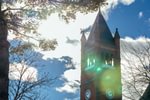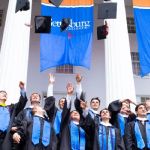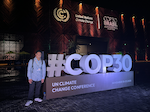

While not all of the college experience takes place in a classroom, a good percentage of it does. The classroom is where you will first work with faculty mentors, ask difficult questions (and be challenged to answer them), and become empowered to explore new possibilities.
After four years here, your courses will change the way you think and view the world.
Read more below about a few of our most unique courses (note the titles!), with thoughts from the professors who teach them.
FYS 120-3 What Would Smokey Say
Why have forest fires from lightning been a part of the effort to maintain a healthy forest since the ‘60s?
Why are the agencies that are in charge of wildlife refugees exterminating the animals they are trying protect?
This First-Year Seminar revolves around the environmental policy and management contradictions of national forests that would make Smokey Bear scratch his head. At the end of the course, first-year students research and plan an expedition to a region of the US and four pieces of federal land that they have never visited. There are also multiple field trips to national parks.
“What’s really cool with the project is that a lot of them picked places that they aren’t necessarily near, like the North West, some in Alaska, the South West deserts, and they come up with these obscure observations,” said Environmental Studies Prof. Randy Wilson. “To me, that’s one of the goals—to broaden their horizons to see the full complexity and diversity of the system.”
FYS 189-4 You’re Not Yelping: From the Critique of Judgment to Consumer Rating Culture
As a class that originated from a South Park episode, this First-Year Seminar examines how tastes, trends, and aesthetics play a central role in our lives and are influenced from unexpected sources: social class, family, education, race and friends.
There are a number of head-scratching discussions, and nothing is off the table—food (with a particular focus on kale), hipsters, and the question of how exactly to define a museum.
“When they come into the class, they don’t realize how taste is something that is not totally in our hands—it’s not depicted as you like what you like—it’s more you’re shaped to like certain things,” said French Prof. Caroline Ferraris-Besso.
PHIL 102 [Title Censored]: An Introduction to Philosophy
The title of this course is censored for a reason, but that doesn’t mean the subject is any less rigorous. Students learn about Aristotle’s virtuously magnanimous person by focusing on the ethically despicable character of the—well, read more for yourself.
“I realized that there might be a new and fun way to introduce students to philosophy that would be akin to the way psychologists teach abnormal psychology. They look at how the brain works by seeing what happens when it does not function properly,” explained Philosophy Prof. Steve Gimbel. “In the same way, I thought, we could look at questions across the philosophical spectrum from the perspective of things gone wrong. It seemed like a fun and clever twist that would appeal to students and make for a more spirited approach to introducing students to what philosophy is.”
ARTH 284 Wonders of Nature and Artifice: The Renaissance Quest for Knowledge and FYS 188-1 Exploration of the marvelous: art and science in the Renaissance
These complementary courses are taught by Art and Art History Prof. Felicia Else and Biology Prof. Kay Etheridge. While examining classic Renaissance collections and the social and scientific context of their development, students are challenged to create their own exhibit. By the end of the semester, their work culminates in a physical and digital display open to the public through Schmucker Art Gallery.
“The exhibition brings together a dynamic range of materials to showcase Gettysburg College’s own wonders of nature and artifice, some specially loaned by Special Collections, Washington and Lee University, College faculty, alumni, trustees and the students themselves,” said Else. Added Etheridge: "Another element was that this pairing of the two courses gave the older students the opportunity to mentor the FY students."
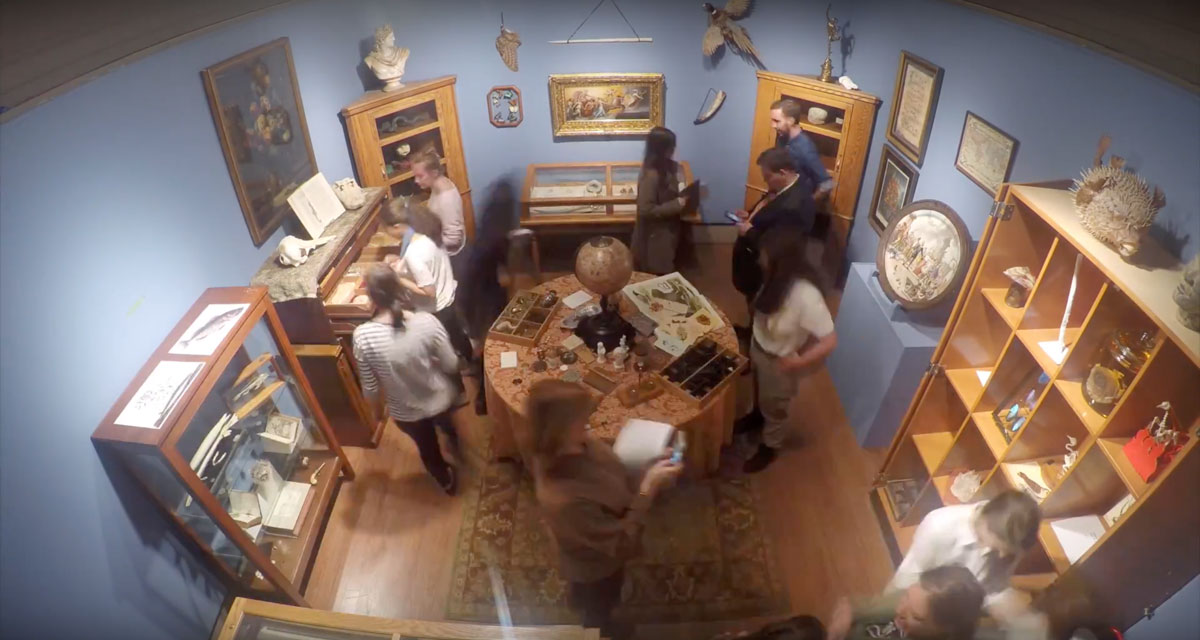
BIO 229 Tropical Terrestrial Biology
Students spend most of the spring semester in a classroom in Gettysburg, learning about tropical biodiversity, community ecology, and conservation. Then, they travel to Manu National Park in Perú as part of a three-week field expedition.
It is an experience so extensive that the course is only offered in alternate years.
“I’m a firm believer that taking students to nature and to the field and getting them to experience it is what makes a big difference in their understanding of tropical biology,” said Biology Prof. Alex Trillo.
Students come to an authentic understanding of the impact of logging because they see the difference between the untouched forests and and forests where human impact is evident.
“They understand climate change in a tangible way because they get rained on when they weren’t supposed to,” continued Trillo. They learn not just the biological concepts, but also gain a very different perspective on global issues by the end of the semester.
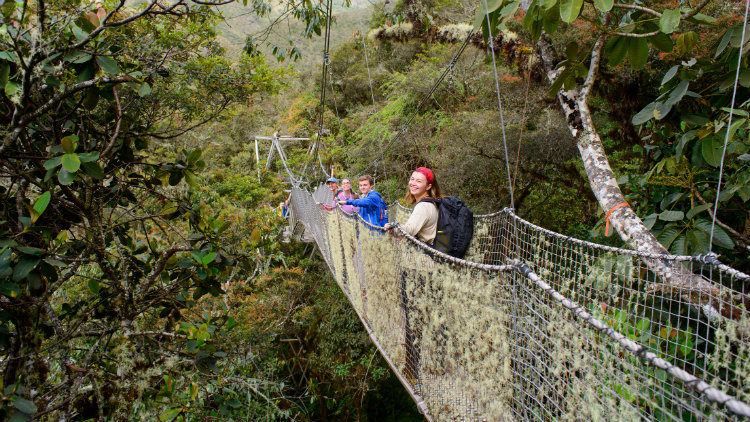
PHY 107 Physics of Music
Part physics, part music, this introductory physics course examines mechanical and sonic characteristics of common musical instruments, room acoustics, human perception of sound, and more.
“There is generally an intrinsic interest in music and sound, and what the course offers is an opportunity to think about the physical processes that produce sound and differentiate sounds, how sound propagates in the environment, and how it is perceived by the listener,” explained Physics Prof. Bret Crawford. “Rather than being a general course in acoustics, this course focuses on how these physical processes affect the production and perception of musical sounds.”
SOC 209 Race and Ethnicity
What do the manifestations of race and ethnicity look like around the world? And how do those manifestations take form in the United States? Students explore these and other questions in this sociology course.
“When I first started teaching this class in 2011-12, I would have a number of students who thought that racism must be a thing of the past, or something that we had overcome with the election of Obama,” said Sociology Prof. Cassie Hays. “It was always fascinating to watch these students come to the gradual realization that many people in our country live with everyday forms of racism, well, every day.”
CWES 320 Aftermath: The Experience of War and Modern Memory
This course—offered by Civil War Era Studies (CWES)—examines how the experiences and memories of war shape our understandings of it. This past semester, students engaged via Skype with students conducting research for the Jack Peirs project on WWI battlefields in France, while examining primary source documents from the project back home.
“The course is unique in that it is a methodologically driven examination of war’s representations and the way that they frame our understanding of conflicts both past and present,” explained CWES Prof. Ian Isherwood ’00. “Students constantly question why wars have been remembered the way that they have—they contrast that sense of memory with history—they discuss the power of myths in framing the ways we remember. It is fun and frustrating business.”
